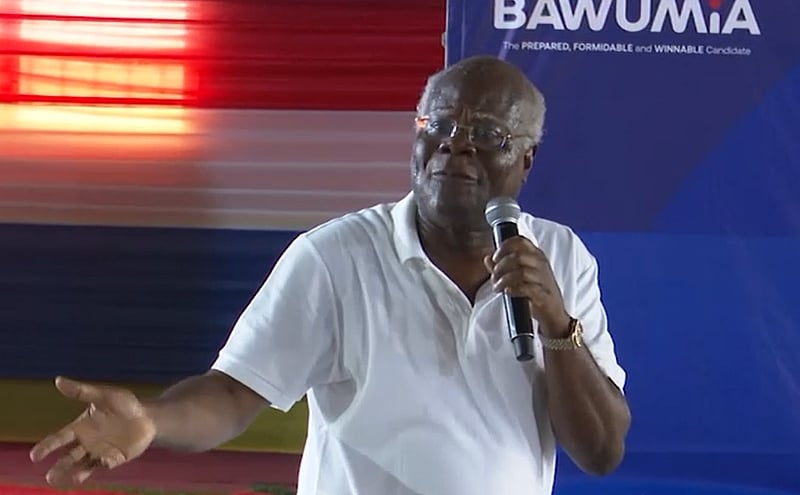K.T. Hammond, a seasoned figure in the New Patriotic Party (NPP) and former Member of Parliament for Adansi Asokwa, issued a stark warning to his party, cautioning against the deepening fissures threatening its unity as it gears up for the crucial 2026 presidential primaries. Speaking passionately to a gathering of NPP supporters during former Vice President Dr. Mahamudu Bawumia’s campaign tour in the Ashanti Region, Hammond bemoaned the growing factionalism within the party, attributing it to the undue influence of wealth in politics and the marginalization of dedicated party members who lack financial resources. He expressed concern that the pursuit of power and influence, fueled by financial clout, was overshadowing the party’s core values and undermining the contributions of its loyal foot soldiers.
Hammond’s address highlighted a growing unease within the NPP regarding the role of money in its internal politics. He pointedly questioned the absence of these now-wealthy individuals during the party’s formative years in the 1990s, a period marked by struggle and financial hardship. He recalled the sacrifices made by himself and other founding members who, despite lacking significant financial resources, dedicated their time, energy, and even personal safety to establish and build the NPP. He contrasted their unwavering commitment with the current trend of financially powerful individuals seemingly attempting to dominate the party’s direction. This sentiment resonated with many long-time party members who felt their contributions were being overlooked in favor of those with deeper pockets.
The former MP’s criticism wasn’t solely directed at the wealthy newcomers; he also called upon all party members, including aspirants for the presidential candidacy, to prioritize unity and collective good above personal ambitions. He warned against arrogance and the wielding of financial power as tools of intimidation and control, arguing that such behavior could fracture the party at a critical juncture. His appeal for unity was a clear message to those engaged in internal power struggles, emphasizing that a divided party stood little chance of success against a united opposition.
Hammond stressed the need for a return to the party’s foundational principles, emphasizing that the NPP’s strength had always resided in its grassroots mobilization and the dedication of its ordinary members. He called for an end to the “innuendos” and divisive rhetoric that were increasingly characterizing internal party discourse. He argued that the practice of sidelining loyal party members based on their financial status was not only unjust but also strategically unwise, as it alienated the very people who had built the party from the ground up.
His message resonated deeply with many party loyalists who felt that the NPP was drifting away from its core values. The increasing influence of money in politics, he argued, was creating a two-tiered system within the party, where those with financial clout were privileged over those who had dedicated years of service but lacked the same resources. This, he cautioned, could lead to disillusionment and apathy among the party’s rank and file, weakening its ability to mobilize support and ultimately jeopardizing its electoral prospects.
Hammond’s intervention was a timely reminder of the importance of unity and inclusivity in the NPP’s pursuit of political power. He underscored the need for the party to recognize and value the contributions of all its members, regardless of their financial standing. He called for a return to a more collaborative and less transactional approach to internal party politics, emphasizing that the NPP’s strength lies in its unity and the shared commitment of its members to the party’s ideals. His warning served as a call for introspection and a plea for the party to prioritize its long-term interests over individual ambitions and the divisive influence of money. He emphasized that only through discipline, togetherness, and a renewed commitment to its core values could the NPP maintain its competitiveness and secure victory in the 2026 elections.


